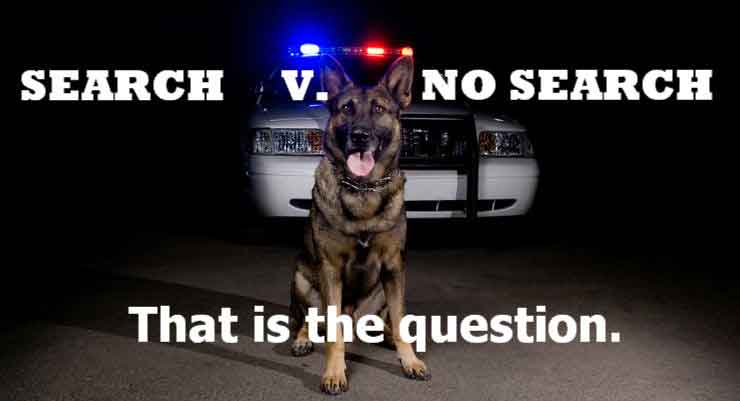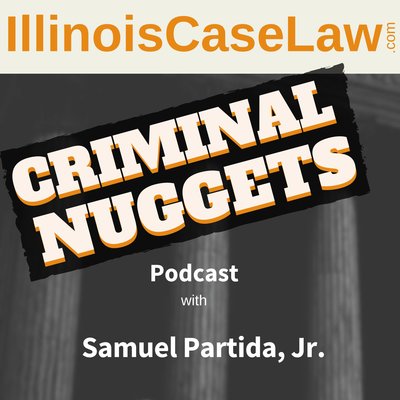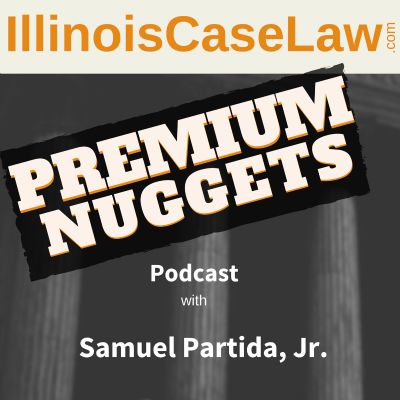Nov 8, 2019
Illinois v. Caballes, 543 U.S. 405 (2005). SCOTIS Notice (Duration 1:43)
This is the SCOTUS case that set the framework for the use of drug dogs in the United States.

[insert mp3 player]
This opinion normalized the use of drug dogs by police departments during traffic stops. The case concluded that police don't need a warrant when they walk a drug dog around a car during a traffic stop.
| Issue | Do police need a warrant to use a drug dog to sniff a car during a traffic stop? |
| Facts | Driver was stopped and ticketed for speeding. During the traffic stop, a canine unit appeared and a dog handler walked the dog around the car. The police dog alerted on the trunk. Police searched the trunk. Driver was arrested for trafficking cannabis. Everything happened in under 10 minutes. He was sentenced to 12 years. |
| Analysis | A privacy interest (that society recognizes as reasonable) cannot exist from aromas that come from completely illegal contraband. There is no right to privacy that protects illegal smells. |
| Holding | Conviction was affirmed because there was no 4th amendment violation. |
| Related Cases |
|
[insert video]
Key Facts In Illinois v. Caballes
Key facts in the case include ...
- Defendant’s car stopped
- He’s ticketed for speeding
- During stop canine unit appeared
- Sniff dog handler walks the dog around car
- Drug dog alerts on the trunk
- Car searched
- Cannabis discovered
- Convicted for trafficking cannabis
- Everything happened in under 10 minutes
The case began as a traffic stop for speeding. The car was stopped and driver ticketed for speeding. During the traffic stop, a canine unit appeared and a dog handler walked the dog around the car. The police dog alerted on the trunk. Police searched the trunk. Driver was arrested for trafficking cannabis.
Everything happened in under 10 minutes.
Key Finding
Key findings from the court:
- Police Dog Drug Sniffs are Not Searches
- Practical Limits Remain
- Not That Many K-9 Units
- Police Can Not Cause an Undue Delay
The case worked its way up to the United States Supreme Court, where the Court’s central finding was that:
“That any interest in possessing contraband cannot be deemed legitimate, ‘and thus, governmental conduct that only reveals the possession of contraband’ compromises no legitimate privacy interest.” Quoting United States v. Place, 462 U. S. 696 (1983).
You don’t have a privacy interest in illegal smells.
The Aftermath of Illinois v. Caballes
This case threatened to blow this issue wide open in favor of the police and the use of drug dogs. The central finding that a police dog sniff was not a search meant the use of drug dogs could perhaps be expanded to other areas besides a traffic stop.
The gist of the ruling is that a privacy interest (that society recognizes as reasonable) cannot exist from aromas that come from completely illegal contraband.
“A dog sniff conducted during a concededly lawful traffic stop that reveals no information other than the location of a substance that no individual has any right to possess does not violate the Fourth Amendment.” Caballes, 543 U.S. 405 (2005).
So if a sniff is not a search police can probably do more of them without running afoul of the 4th amendment.
There Are Still Limitations
Yet, even Caballes recognized limits on the use of police dogs during a traffic stop. Beginning with Caballes itself, we can see that fundamental limits on the use of sniffer dogs during traffic stops were built right into the system.
The Court approvingly noted that the police officers detaining Caballes did not delay the traffic stop just so that the drug dog could finish the sniffing.
This is important.
Had the Court found undue delay, the clear inference is that the case would have come out differently. This is what the court is talking about when it mentions a “prolonged” traffic stop.
The Court wrote that:
“A seizure that is justified solely by the interest in issuing a warning ticket to the driver can become unlawful if it is prolonged beyond the time reasonably required to complete that mission.” Caballes, 543 U.S. 405 (2005).
Similarly, delaying the writing of the ticket or returning a driver’s license so slowly that the dog has time to finish the sniff is unconstitutional. This may also be referred to as going “outside the scope” of the traffic stop.
This “no delay” or “scope” rule serves as a real and practical limitation on the use of police dogs.
Any Undue Delay is Unconstitutional
The simple fact is that K-9 units are far less numerous than normal patrol vehicles. This specialized team is typically only called out on special assignments. The practicality of having a drug dog at every traffic stop is impossible.
The criminal defense bar, however, has to be vigilant about recognizing stone walling by the police. Any proof of an unconstitutional delay must be brought to the trial court’s attention in a motion to suppress evidence illegally seized.



